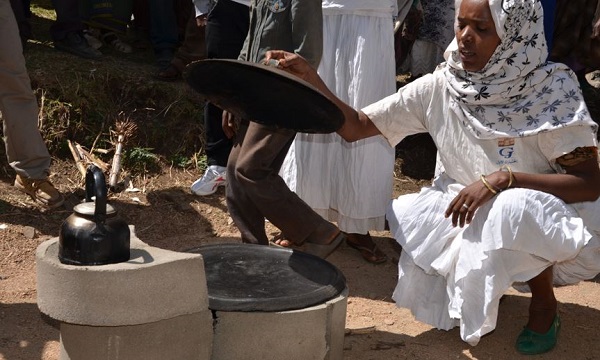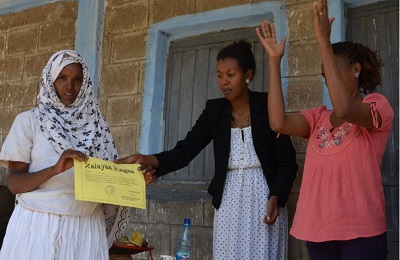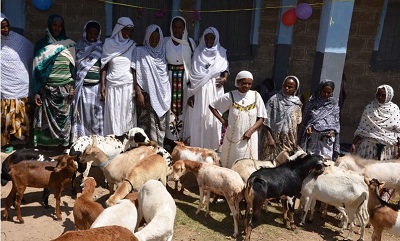Empowered Woman Transforms Lives in Rural Ethiopia
Date:

Ethiopia: For the middle aged energetic mother of six, Kimiyaa Umar, lack of capital and the basic knowledge on how to run a viable business constrained her from establishing a business and to improve her family’s livelihood. This was until a year ago when she received 3,000 Birr interest free loan equivalent of 140USD together with a training on basic business skills and entrepreneurship through the UN Joint Programme on Gender Equality and Women’s Empowerment’s income generating activities, which has benefited over 19,500 disadvantaged women throughout Ethiopia.
Today Kimiyaa, a leader for a group of 13 women, who are benefiting from the programme, is improving her family and her group members’ lifestyles. This is by enabling herself and each of her group members to save and invest in labour, time and energy saving cooking stove technology cooperative targeting women in their village and beyond.
“Before receiving the loan we were given training on how to start and manage a business including how to save and the benefits of saving. Using the skills gained, we started different businesses and now each one of us has finished paying back the 3,000 Birr loan, and saved enough to invest in a different cooperative business of labour, time and energy saving cooking stove technology. Each member uses this technology in her house. We also sell the stoves in different villages to benefit more women,” explained Kimiyaa, who added that currently the stove technology cooperative, which began a year ago has sixty members with a total capital of 40,000 Birr an equivalent of about USD 2,000.
“We were selected to benefit from the programme for being the neediest and had no capital or the knowledge on how to deal with business. Today, we are the model in our village and many women have started to organize themselves by self-initiation,” said Kimiyaa whose leadership style has been attributed to the success of the group as she strictly applied the rules the group established in timely paying back of the loans and saving for expansion.
Kimiyaa, who got public recognition for this achievement by the district’s Children and Women Affairs Bureau, has also changed her family’s lifestyle using the loan.

A year ago Kimiyaa’s children’s educational materials were not provided in full. They didn’t even have the chance to study in the evenings as their house had no sufficient light to use since the only available source of light was a small locally made Kerosene lamp. The goats-selling business she started first using the 3,000 Birr loan is making a difference as she used part of the profit to purchase a solar lamp, which her children today use to study longer with enough light.
“When I first got the 3,000 Birr loan, I purchased 2 female goats and one male goat. I fattened the male goat, which I bought for 600 Birr and sold it for 1,500 Birr. Each of the two female goats gave birth to two totaling the goats to six. I sold the 3 goats and paid back the 3,000 Birr loan. From this business I have profited three goats and the solar lamp I purchased for 500 Birr in addition to the 260 Birr saved in a bank according to the group’s regulation,” explained Kimiyaa, who added that each member of her group has changed hers and her family’s living condition for better as a result of the support from the program.
Kimiyaa is convinced that the benefit they all got is enormous and the potential to make a difference at community level is great. “Over 200 women in our village got influenced by us and started saving the little they have by self-initiation. They also come to us for some advice. If more is invested in such women, we will make a lasting change.” Kimiyaa is appreciative of the support by the Joint Program especially of the interest free loan, which she said assisted them to benefit more in short time and motivated them to keep working hard. Kimiyaa believes that investing in women benefits the whole community.

The Gender Equality and Women’s Empowerment Joint Programme (GEWE JP) in Ethiopia was launched in 20011 and brings together 6 UN Agencies (UNDP, ILO, UN Women, UNESCO, UNICEF and UNFPA) to support the Government of Ethiopia in its efforts to improve the lives of Ethiopia women and girls. Aligned to the government’s Growth and Transformation Plan, and grounded in the UN Development Assistance Framework (UNDAF) for Ethiopia, the GEWE JP targets women in the 11 regions aiming to increase rural and urban women’s income to improve food security, nutrition and livelihoods; rural and urban women’s opportunities for education, leadership and decision making; strengthen the capacity of federal and local government’s institutions to implement national and international commitments on gender equality and women’s empowerment; and enhance the capacity of federal and local government’s institutions and communities to promote and protect the rights of women and girls.
To increase the rural and urban women’s income, one of the applied activities under the programme with the support of ILO and UN Women is the provision of interest free loans to needy women along with training on basic business skills and entrepreneurship so as to enable them start income generating activities. The returned loan by the women has been used as a revolving fund to economically empower more women. Over 19,500 women in Ethiopia have benefited from this.